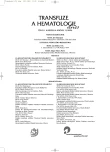Transmission of prion disease by blood and hot news in detection methods of abnormal prion protein
Přenos prionových chorob krví a novinky v detekci abnormálního prionového proteinu
Prionové choroby, neboli transmisivní spongiformní encefalopatie (TSE), jsou neurodegenerativní onemocnění, která postihují lidi i zvířata. Lidské TSE lze rozdělit na sporadické (85 % případů), dědičné (10–15 % případů) a získané (2–3 % případů). Nejčetnější je sporadická Creutzfeldt-Jakobova choroba (sCJD). O jejich příčině a progresi chybí mnoho informací, a tak stále není k dispozici léčba a co víc, neexistuje rychlý test pro detekci infekčního prionu ante mortem. Ve Velké Británii byly nedávno publikované dva případy pravděpodobného přenosu variantní Creutzfeldt-Jakobovy choroby (vCJD) krevní transfuzí. vCJD vzniká v důsledku konzumace potravin kontaminovaných infekčními priony z tzv. šílených krav, tedy dobytka trpícího bovinní spongiformní encefalopatií (BSE). vCJD se dosud v České republice neobjevila, BSE nicméně ano, a ačkoliv jsou dodržována bezpečnostní opatření, nelze stoprocentně vyloučit možnost výskytu vCJD. Taková možnost při současné neexistenci testu pro detekci prionových chorob ante mortem je alarmující pro transfuzní medicínu. Tento článek seznamuje čtenáře se základními fakty o vCJD a přenosu této prionové choroby krví, v závěru informuje o novinkách na poli detekce infektivity v krvi.
Klíčová slova:
prionový protein, PrPsc, Creutzfeldt-Jakobova choroba, CJD, preklinická detekce
Authors:
A. Broučková
Authors‘ workplace:
Ústav imunologie a mikrobiologie, 1. LF UK, Praha
Published in:
Transfuze Hematol. dnes,12, 2006, No. 1, p. 31-36.
Category:
Comprehensive Reports, Original Papers, Case Reports
Overview
Prion diseases, so called transmissible spongiform encephalopathies (TSE), are neurodegenerative diseases, which affect both human and animals. Around 85% of human prion diseases is sporadic, 10–15% is inherited and 2–3% is acquired. The most frequent one is sporadic Creutzfeldt-Jakob disease (sCJD). As yet there is no treatment available, moreover we are not able to rapidly detect prion protein ante mortem. In England two cases of variant Creutzfeldt-Jakob disease (vCJD) transmitted by blood have been reported recently. vCJD rises due to exposure to bovine spongiform encephalopathy (BSE) contaminated food. There has been no case of vCJD in Czech Republic yet, however, despite preventive measures 20 cases of BSE have been already detected. Therefore, we can not exclude incidence of vCJD in Czech Republic. Such a case is a threat for transfusion medicine, as there is no available screening test. This article is dedicated to vCJD and transmission of this disease by blood. Hot topics from diagnostic field are presented at the end.
Key words:
prion protein, PrPsc, Creutzfeldt-Jakob disease, CJD, preclinical detection
Labels
Haematology Internal medicine Clinical oncologyArticle was published in
Transfusion and Haematology Today

2006 Issue 1
- Monitoring of Joint Health is an Important Part of Hemophilia Care
- Impact of Prophylaxis on Reducing the Risk of Neurological Problems Associated with Bleeding in Hemophilia A
- Minimum and Optimal Factor Levels in Physically Active Hemophiliacs
- Position of aPCC in the Treatment of Hemophilia A Complicated by the Development of Inhibitors
- Administration of aPCC as a Prevention of Bleeding After Major Cardiac Surgical Procedures
-
All articles in this issue
- Real cost of chronic myeloid leukemia treatment with nonmyeloablative hematopoietic stem cell transplantation and comparison with cost of hypothetical imatinib treatment. What shall be considered in the cases of extremely costly medical procedures?
- The use of alemtuzumab in allogeneic stem cell transplantation
- Immunophenotyping of childhood leukaemias
- Optimalization of extracellular fetal DNA isolation for non-invasive fetal SRY, RHD and RHCE genotyping from maternal peripheral blood
- Transmission of prion disease by blood and hot news in detection methods of abnormal prion protein
- Plasmatic concentration of soluble endoglin in patients with lymphoid malignancies
- Transfusion and Haematology Today
- Journal archive
- Current issue
- Online only
- About the journal
Most read in this issue
- Real cost of chronic myeloid leukemia treatment with nonmyeloablative hematopoietic stem cell transplantation and comparison with cost of hypothetical imatinib treatment. What shall be considered in the cases of extremely costly medical procedures?
- Transmission of prion disease by blood and hot news in detection methods of abnormal prion protein
- Immunophenotyping of childhood leukaemias
- The use of alemtuzumab in allogeneic stem cell transplantation
